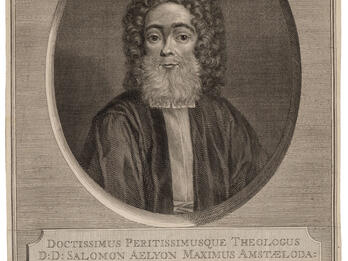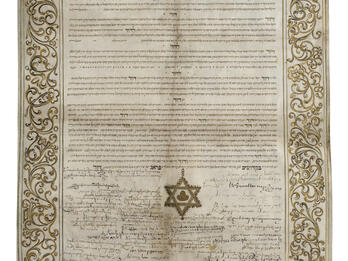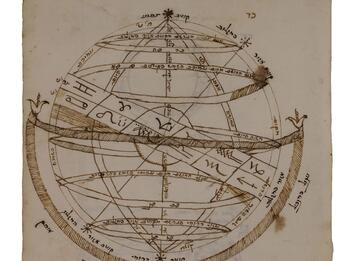Livro de ascamot (Book of Regulations): On the Education of Children
Rules and regulations of Talmud Torah, now consolidated, and the general council of our community of Hamburg, whereby the members of the general council shall elect as parnasim (community leaders) Joshua Palacios, Joseph Yeshurun, and Joseph Abendana, giving them full authority to act in all matters as they best deem fit, and with their approval and in their name, the following matters are hereby promulgated for the glory and in the service of the blessed God and the enhancement of His Holy Law.
1. All the registered teachers, taking special care and exercising continued vigilance in the instruction of their pupils, shall proceed appropriately to their schools before the appointed hour, which shall be, as follows:
In the morning, one-half hour after the conclusion of the prayer service and in the afternoon, for one-and-a-half hours, and they shall teach from the beginning of Kislev until the end of Shevat, and, if it be a thirteen-month [leap] year, until the end of Adar I, two-and-a-half hours in the morning and two-and-a-half in the afternoon, and the rest of the year, three hours in the morning and three hours in the afternoon.
On Fridays, they will come to school in the morning just as the prayer service is ending and shall teach for one hour, having all the pupils review the weekly Torah portion from beginning to end and the Haftarah [prophetic selection] of that week so that they know it perfectly, and, on the Sabbath, can hear and speak properly with the cantor in the synagogue.
On the Sabbath, they shall come one hour before Minḥah [the afternoon service] and shall teach for that hour until it is time to recite Minḥah.
On Passover eve and its festival days, they are to be given holiday leave.
On the intermediate days [of Passover], they shall come only in the mornings at the appointed times and shall be given leave in the afternoons.
The two days of Purim; one day of Hanukkah, whichever is most convenient; Tu bi-Shevat, which is the New Year of the trees; the fourteenth of Iyar, which is Pesaḥ sheni (Second Passover); Lag b’Omer (thirty-third day after Passover); and Tu be-Av (fifteenth of Av), they are given holiday leave. And every [nonholiday] day, they shall come a half hour before Arvit (the evening service) in summer to recite Psalms in the synagogue and a quarter hour beforehand in winter.
The first two days of the festivals celebrated in the country, namely Easter, Pentecost, and Christmas, they are to be given holiday leave and all the pupils must move about very quietly or stay at home.
2. Should any of the venerable teachers contravene their obligations and diligence in the instruction of the pupils and not proceed to their school at the appointed times, without having a worthy excuse for them to be given leave, such as illness or any other convincing reason, they shall be immediately fined eight placas [stuiver; 20 of these make up a guilder] for each time they are absent, to be discounted from their salary and they may not be exonerated, so as to ensure strict compliance with their obligations and any other penalty that may be levied upon them.
The treasurer of the community shall not pay them their salary without written consent of the honorable parnasim that they have well and properly discharged their duties and shall not allow anyone to come to school to talk or disturb them while they are teaching.
3. Pupils who fail to come to school or to the synagogue at the appointed times, and are not very quiet there in reciting their prayers—where they shall be very proper and well-behaved, because the prayers are the basis for everything else—since it is very important for the divine service and the decorum required for His Holy Law and the devotion we must have in our prayers, particular care must be taken in this regard and they will be punished to the extent they deserve without respecting or excepting anyone so that they are instilled with fear and conduct themselves with scrupulous care.
4. The parents or older relatives of the pupils shall not mistreat the venerable teachers for punishing the pupils or for any other reason, but rather show them the dignity and respect they deserve, encouraging them to teach with more enthusiasm; and when they have a complaint against them, they should speak to the honorable parnasim that the latter assist in this matter; and when this is insufficient and they do otherwise, the honorable seven members of the general council shall take it upon themselves to punish whoever acts in this manner. And all the pupils, even those who are not from their school or class, shall obey and respect all the aforesaid teachers as is their due. And the venerable teachers, for their part, shall be very scrupulous in fulfilling everything that the honorable parnasim enjoin them to do on pain of being penalized by them, the honorable seven [members of the council] notwithstanding.
5. The honorable parnasim shall proceed to visit the schools every day, each parnas on his scheduled day, morning and afternoon, and when, by dint of circumstances, one of them cannot go on his appointed day, he shall ask one of his colleagues to do so for him, not only so that the venerable teachers fulfill their obligation but also so that the pupils come promptly and advance in their studies and so that, by their presence, nothing be amiss.
6. Thursday mornings, the teachers shall have the pupils repeat the week’s lesson and, in the afternoon, they shall have the small children repeat the blessings and part of the prayer service. They should take great care that all the pupils come to know the material and say it perfectly well in the synagogue, as expressed in article three. And they shall also be taught proper manners and civility, and speak with all modesty and not swear or use foul language of any kind, but rather be enjoined to walk very quietly in the street.
7. Sundays before the beginning of the new [Hebrew] month or beginning on Thursday, the teachers shall test all the pupils, with the honorable parnasim in attendance, and shall note to what degree each one has progressed and they shall give a more advanced lesson to those pupils who have earned it, and those who excel in their studies shall be given front-row seats so that they know that they are deserving of such an honor. And on the examination that is administered before the beginning of Sivan, those who are deserving of a prize shall be noted, so that they may be promptly instructed in matters pertaining to pronunciation and cantillation or musical accents, for such an important course of instruction as reading Hebrew is entrusted to the care of the honorable teachers. And whoever excels in this, shall be deserving of a prize, and the others will recite their lessons on Shavuot in the synagogue, where people shall proceed to see how well the pupils have progressed in their studies, and approximately fifty marks shall be expended for this by the honorable community treasurer and for the expenditure required for maintaining the schools.
Credits
Published in: The Posen Library of Jewish Culture and Civilization, vol. 5.





